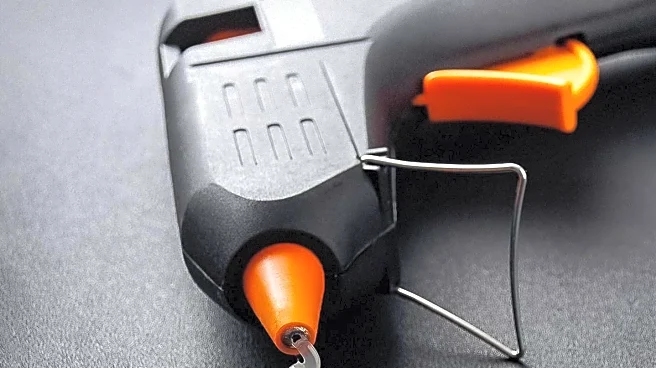What's Happening?
Scientists at the Technion – Israel Institute of Technology have developed a new smart biological adhesive that could significantly alter surgical practices. This innovative material, inspired by the natural adhesive properties of mollusks, can bond to
tissues within seconds and safely biodegrade inside the body. Traditionally, surgeons have used stitches and metal staples to close incisions, which, while effective, are invasive and can lead to infections. The new adhesive offers a less invasive alternative, potentially reducing trauma and improving healing outcomes. The development, led by Dr. Shady Farah, utilizes a polymer-based hydrogel that mimics human tissue and adheres effectively even in wet conditions. This breakthrough has shown strong antibacterial properties, preventing postoperative infections, and has been successful in laboratory and animal tests.
Why It's Important?
The introduction of this smart biological glue could have profound implications for the medical field, particularly in surgical care. By reducing the need for traditional stitches and staples, the adhesive could lower the risk of infections and improve recovery times for patients. This development is particularly significant given the high incidence of surgical site infections, which affect millions annually and can lead to severe complications. The adhesive's ability to biodegrade safely within the body also addresses concerns about foreign materials causing adverse reactions. Furthermore, the potential for improved cosmetic outcomes, such as reduced scarring, could enhance patient satisfaction and quality of life post-surgery.
What's Next?
The Technion team plans to advance their research by conducting tests on large-animal models that more closely resemble human physiology. This step is crucial before moving on to clinical trials in humans. If successful, the adhesive could become a standard tool in surgical procedures, offering a safer and more efficient method for wound closure. The team aims to begin these large-animal tests within the next year, paving the way for eventual human trials and potential widespread adoption in medical practice.
Beyond the Headlines
This development not only represents a technological advancement in surgical care but also highlights the potential of biomimicry in medical innovation. By learning from nature's solutions, researchers can create materials that are both effective and biocompatible. The adhesive's design, which allows for 3D printing and customization, also points to a future where personalized medical treatments become more common, potentially transforming how surgeries are performed and how patients recover.
















